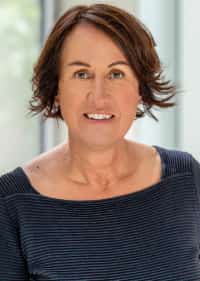
Head
Metabolomics and Proteomics Core (CF-MPC)
Helmholtz Zentrum München
Ingolstädter Landstr. 1
85764 Neuherberg
Tel.: 089-3187-3941
Mobile: +49 15142670239
email: stefanie.hauck@helmholtz-munich.de
Dr. rer. nat. Stefanie Hauck leitet seit 2021 die Metabolomics and Proteomics Core Facility am Helmholtz Zentrum München (Helmholtz Munich). Sie studierte Biologie an der Universität Regensburg und der Ludwig-Maximilians-Universität München, gefolgt von der Promotion im Fach Biologie. Schwerpunkte ihrer Arbeiten lagen im Bereich Signaltransduktion, Zellbiologieund Mechanismen der Neuroprotektion in der Netzhaut.
Ihr Forschungsfokus am Helmholtz Munich ist die Aufklärung des Zusammenwirkens von genetischer Varianz und Umweltfaktoren bei neurodegenerativen Krankheiten und Stoffwechselerkrankungen. Dabei kommen vielfältige proteomische und metabolomischeMethoden zum Einsatz, mit Schwerpunkt auf neuesten massenspektrometrischen Technologien, ergänzt durch affinitätsbasierte Methoden (Olink Technologie). Stefanie Hauck ist unter anderem Mitglied der Graduate School of Systemic Neuroscience (GSN) und Mitglied im Clinical MassSpectrometry Center CLINSPECT-M, sowie Mitglied der DGPF (seit 2005), wo sie bereits zwischen 2013 und 2017 und seit 2022 im Vorstand tätig war.
https://www.helmholtz-munich.de/en/core-facility-overview/metabolomics-and-proteomic
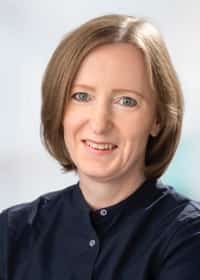
Lehrstuhl Biochemie II
Theodor-Boveri-Institut, Biozentrum, Fakultät für Chemie und Pharmazie
Julius-Maximilians-Universität Würzburg
Am Hubland
97074 Würzburg
E-Mail: bettina.warscheid@uni-wuerzburg.de
Homepage: warscheidlab.de; https://www.biozentrum.uni-wuerzburg.de/biochem2/
ORCID: ORCID 0000-0001-5096-1975
Qualifications and Career
Since 2022 | Professor (W3) and Chair of Biochemistry II, Faculty of Chemistry and Pharmacy, University of Würzburg, Germany |
2010-2021 | Professor (W3) of Biochemistry and Functional Proteomics, Faculty of Biology, University of Freiburg, Germany |
2009-2010 | Professor (W2) of Clinical and Cellular Proteomics, Medical Faculty and Centre for Medical Biotechnology, University of Duisburg-Essen, Germany |
2004-2010 | Junior-Professor (W1) for Protein Mass Spectrometry, Medical Faculty, University of Bochum, Germany |
2003-2010 | Group leader, Cellular Proteomics, Medical Proteome Center, University of Bochum, Germany |
2002-2003 | Postdoc, University of Maryland, College Park, and Johns Hopkins University, School of Medicine, Baltimore, USA |
2002 | PhD in Analytical Chemistry, Leibniz Institute of Analytical Sciences (ISAS), Dortmund, Germany |
1991-1997 | Diploma studies in Chemistry, Technical University Dortmund, Germany |
Commissions of Trust
Since 2017 | Steering Board Member of the ‘German Society of Proteome Research’ (DGPF) |
2019-2021 | Member of Bioinformatics Strategic Committee, University of Freiburg |
2019-2021 | Member Cluster of Excellence CIBSS Research Infrastructure Committee and Coordinator of research area CIBSS-D ‘Integrative Signalling Technologies’ |
2018-2021 | Member of Research Infrastructure Board, University of Freiburg |
2017-2021 | Founding and Steering Board Member of the Excellence Cluster CIBSS |
2010-2020 | Steering Board Member of the Excellence Cluster BIOSS |
2018-2019 | Vice Dean of the Faculty of Biology, University of Freiburg |
2016-2018 | Dean of the Faculty of Biology, University of Freiburg |
2016-2018 | Member of the Senate, University of Freiburg |
2014-2016 | Academic Dean of the Faculty of Biology, University of Freiburg |
2011-2013 | Editorial advisory board member of the ‘Journal of Proteome Research’ |
2007-2010 | Member of the HUPO membership committee |
Academic Distinctions
2019-2022 | Principal Investigator of the Excellence Cluster CIBSS |
2015-2020 | ERC Consolidator Grant (as partner) |
2010-2020 | Principal Investigator of the Excellence Cluster BIOSS |
2010 | Innovative Research Project Award, Structural and Innovation Fond for Research (SI-BW), Ministry of Science, Research and the Arts Baden-Württemberg |
2010 | Call for a core professorship position of the Excellence Cluster BIOSS Centre for Biological Signalling Studies, University of Freiburg, Freiburg, Germany |
2002-2003 | DFG Fellowship for research in the laboratories of Prof. Catherine Fenselau at the University of Maryland, College Park, MD, and Prof. Robert Cotter at the Johns Hopkins University, School of Medicine, Baltimore, MD, USA |
1996 | ERASMUS stipend for studies at Leiden University, Leiden, The Netherlands |
Selected Publications (last 10 years)
Fricke AL, Mühlhäuser WD, Reimann L, …, Warscheid B (2023) Phosphoproteomics profiling defines a target landscape of the basophilic protein kinases AKT, S6K and RSK in skeletal myotubes; J Proteome Res 22 :768-789.
Dewar C, Oeljeklaus S, Mani J, …, Warscheid B*, Schneider A* (2022) Mistargeting of aggregation prone mitochondrial proteins activates a nucleus-mediated posttranscriptional quality control pathway in trypanosomes. Nat Commun 13: 3084. *senior authorship
Morgenstern M, Peikert CD, Lübbert P, …, Warscheid B (2021) Quantitative high-confidence human mitochondrial proteome and its dynamics in cellular context. Cell Metab 33: 2464-2483.
Schwarz J, Grundmann L, Kokot T, …, Warscheid B (2021) Quantitative proteomics identifies PTP1B as modulator of B cell antigen receptor signaling, Life Sci Alliance, 4: e202101084.
Dannenmeier S, Desroches Altamirano C, …, Warscheid B (2021) Quantitative proteomics identifies Ola1p as a positive regulator of heat shock response, J Biol Chem, 297:101050.
Reimann L, Schwäble AN, Fricke A, …, Warscheid B (2020) Phosphoproteomics identifies dual-site phosphorylation in an extended basophilic motif regulating FILIP1-mediated degradation of filamin-C. Commun Biol 3:253.
Lill P, Hansen T, Wendscheck D, …, Warscheid B*, Erdmann R*, Gatsogiannis C* (2020) Towards the molecular architecture of the peroxisomal receptor docking complex; Proc Natl Acad Sci U S A, 117(52):33216-33224. *senior authorship
Mårtensson CU, Priesnitz C, Song, …, Warscheid, B., Becker, T. (2019) Mitochondrial protein translocation associated degradation, Nature, 569:679-683.
Topf U, Suppanz I, Samluk L, …, Warscheid B (2018) Quantitative proteomics identifies redox switches for global translation modulation by mitochondrially produced reactive oxygen species. Nat Commun 9: 324.
Dannenmaier S, Stiller S, Morgenstern M, ..., Warscheid B. (2018) Complete native stable isotope labeling by amino acids of Saccharomyces cerevisiae for global proteomic analysis, Anal Chem, 90:10501-10509.
Morgenstern M, Stiller SB, Lübbert P, …, Warscheid B (2017) Definition of a high confidence me at quantitative scale. Cell Rep 9: 2836-2852.
Peikert CD, Mani J, Morgenstern M, …, Warscheid B (2017) Charting organellar importomes by quantitative mass spectrometry. Nat Commun 8: 15272.
Reimann L, Wiese H, …, Warscheid B (2017) Myofibrillar Z-discs are a protein phosphorylation hot spot with PKCα modulating protein dynamics. Mol Cell Proteomics 16: 346-367.
Wrobel L, Topf U, Bragoszewski P, ..., Warscheid B*, Chacinska A* (2015) Mistargeted mitochondrial proteins activate a proteostatic response in the cytosol. Nature 524: 485-488. *senior authorship
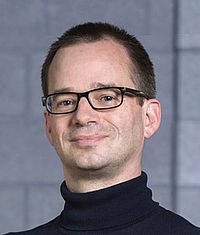
Institut für Immunologie, Universitätsmedizin
der Johannes-Gutenberg Universität Mainz,
Helmholtz-Institut für translationale Onkologie (HI-TRON), DKFZ,Mainz
Langenbeckstr. 1, D-55131 Mainz
Tel.: 06131/ 17 6199, Fax: 06131 / 17 6202
E-Mail: tenzer@uni-mainz.de
Familienstatus: verheiratet, 2 Kinder
Nationalität: Deutsch
| Aktuelle Position: | |
| 2022 – | 2022 – W3-Professor für Immunoproteomik (duale Affiliation) Institut für Immunologie, Universitätsmedizin der Johannes-Gutenberg Universität Mainz Helmholtz-Institut für translationale Onkologie (HI-TRON), DKFZ, Mainz |
| 2020 – | Koordinator des BMBF-Forschungskerns „DIASyM“ im Rahmen der MSCORESYS-Initiative |
| 2009 – | Leiter der Core Facility für Massenspektrometrie und Proteinbiochemie, Forschungszentrum für Immuntherapie (FZI), Universität Mainz |
| Wissenschaftlicher Werdegang: | |
| 2016 – 2021 | W2-Professor für Quantitative Proteomanalytik, Institut für Immunologie, Universitätsmedizin der Johannes-Gutenberg Universität Mainz |
| 2012 – 2019 | Leiter der Proteomics und Transcriptomics Unit (ProTic) des Forschungszentrums translationale Neurowissenschaften(FTN) Mainz |
| 2005 - 2008 | Leiter der Core Facility für Massenspektrometire und Proteinbiochemie des Immunology Cluster of Excellence ‘Immunointervention’ der Johannes Gutenberg-Universität Mainz |
| 2005 - | Arbeitsgruppenleiter für Antigenprozessierung und Massenspektrometrie am Institut für Immunologie, Johannes-Gutenberg-Universität Mainz |
| 2004 - | Mitglied des DFG Sonderforschungsbereichs 490 ‘Invasion and Persistence of Infectious Pathogens’ an der Universität Mainz |
| 2004 -2005 | Postdoc, Institut für Immunologie, Universitätsmedizin der Johannes-Gutenberg Universität Mainz |
| 2000 -2004 | Dissertation (Dr. rer. nat.) am Institut für Zellbiologie, Abt. Immunologie. Betreuer: Prof. Dr. H.-G. Rammensee. |
| 1994 - 2000 | Studium der Biochemie an der Eberhard-Karls-Universität Tübingen |
| Preise und Auszeichnungen | |
| 1997 | Fulbright-Travel Grant |
| 2007 | Boehringer Ingelheim Forschungspreis |
| 2011 | NMFZ Forschungspreis |
Weitere Aktivitäten in der wissenschaftlichen Gemeinschaft
- Mitglied im Vorstand der European Proteomics Association (EuPA)
- Sprecher der BMBF Initiative „MSCORESYS“ (2021-2022)
- Stellvertretender Sprecher der BMBF Initiative „MSCORESYS“ (2020-2021)
- Vizepräsident der Deutschen Gesellschaft für Proteomforschung
- Editor der HUPO-PSI Quality Control Working Group
- Mitglied des Editorial Boards: Scientific Reports
- Gutachter für wissenschaftliche Fachzeitschriften:
Nature Nanotechnology, Nature Methods, Nature Communications, Bioinformatics, ACS nano, Journal of Proteomics, etc. - Fachgutachter: DFG, FWO, WWTF, ANR, NRF, DKFZ
Originalpublikationen (10 ausgewählte):
- Navarro P, Kuharev J, Gillet LC, Bernhardt OM, MacLean B, Röst HL, Tate SA, Tsou CC, Reiter L, Distler U, Rosenberger G, Perez-Riverol Y, Nesvizhskii AI, Aebersold R, Tenzer S. 2016. A multicenter study benchmarks software tools for label-free proteome quantification.
Nat Biotechnol. 34(11):1130-1136. doi: 10.1038/nbt.3685.
Zitationen: 169 - Distler U, Kuharev J, Navarro P, Tenzer S. 2016. Label-free quantification in ion mobility-enhanced data-independent acquisition proteomics.
Nat Protoc. 11(4):795-812. doi: 10.1038/nprot.2016.042.
Zitationen: 145 - Distler U, Kuharev J, Navarro P, Levin Y, Schild H, Tenzer S. 2014. Drift time-specific collision energies enable deep-coverage data-independent acquisition proteomics.
Nat Methods. 11(2):167-70. doi: 10.1038/nmeth.2767.5.
Zitationen: 316 - Tenzer S*, Docter D, Kuharev J, Musyanovych A, Fetz V, Hecht R, Schlenk F, Fischer D, Kiouptsi K, Reinhardt C, Landfester K, Schild H, Maskos M, Knauer SK, Stauber RH*. 2013. Rapid formation of plasma protein corona critically affects nanoparticle pathophysiology. *corresponding authors
Nat Nanotechnol. 8(10):772-81. doi: 10.1038/nnano.2013.181.
Zitationen: 1482 - Adamopoulou E, Tenzer S, Hillen N, Klug P, Rota IA, Tietz S, Gebhardt M, Stevanovic S, Schild H, Tolosa E, Melms A, Stoeckle C. 2013. Exploring the MHC-peptide matrix of central tolerance in the human thymus.
Nat Commun. 4:2039. doi: 10.1038/ncomms3039
Zitationen: 78 - Günther C, Martini E, Wittkopf N, Amann K, Weigmann B, Neumann H, Waldner MJ, Hedrick SM, Tenzer S, Neurath MF, Becker C. 2011. Caspase-8 regulates TNF-α-induced epithelial necroptosis and terminal ileitis.
Nature. 477(7364):335-9. doi: 10.1038/nature10400.
Zitationen: 666 - Tenzer S, Docter D, Rosfa S, Wlodarski A, Kuharev J, Rekik A, Knauer SK, Bantz C, Nawroth T, Bier C, Sirirattanapan J, Mann W, Treuel L, Zellner R, Maskos M, Schild H, Stauber RH. 2011. Nanoparticle Size Is a Critical Physicochemical Determinant of the Human Blood Plasma Corona: A Comprehensive Quantitative Proteomic Analysis.
ACS Nano. 5(9):7155-67. doi: 10.1021/nn201950e
Zitationen: 710 - Tenzer S, Wee E, Burgevin A, Stewart-Jones G, Friis L, Lamberth K, Chang CH, Harndahl M, Weimershaus M, Gerstoft J, Akkad N, Klenerman P, Fugger L, Jones EY, McMichael AJ, Buus S, Schild H, van Endert P, Iversen AK. 2009. Antigen processing influences HIV-specific cytotoxic T lymphocyte immunodominance.
Nat Immunol. 10(6):636-46. doi: 10.1038/ni.1728.
Zitationen: 191 - Reineke J*, Tenzer S*, Rupnik M, Koschinski A, Hasselmayer O, Schrattenholz A, Schild H, von Eichel-Streiber C. 2007. Autocatalytic cleavage of Clostridium difficile toxin B. *contributed equally
Nature. 446(7134):415-9.
Zitationen: 248 - Tenzer S, Peters B, Bulik S, Schoor O, Lemmel C, Schatz MM, Kloetzel PM, Rammensee HG, Schild H, Holzhütter HG. 2005. Modeling the MHC class I pathway by combining predictions of proteasomal cleavage, TAP transport and MHC class I binding.
Cell Mol Life Sci. 62(9):1025-37.
Zitationen: 295
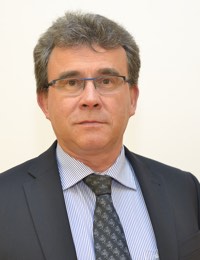
Universitätsmedizin Greifswald
Interfakultäres Institut für Genetik und Funktionelle Genomforschung
Abteilung für Funktionelle Genomforschung
Felix-Hausdorff-Str. 8
17489 Greifswald
Tel.: 03834 420 5800
E-Mail: voelker@uni-greifswald.de
- seit 2008
W3-Professor für Funktionelle Genomforschung im Interfakultären Institut für Genetik und Funktionelle Genomforschung - 2002-2008
C3-Professor für Funktionelle Genomforschung an der Medizinischen Fakultät der Ernst-Moritz-Arndt-Universität Greifswald - 1996-2002
Wissenschaftlicher Assistent (C1) an der Philipps-Universität Marburg und am Max-Planck Institut für terrestrische Mikrobiologie - 1999
Lehrbefugnis an der Philipps-Universität Marburg für die Fachgebiete Mikrobiologie und Molekularbiologie - 1993 – 1996
Postdoktorand im Labor von Prof. Dr. W.G. Haldenwang, Univ. Texas Health Science Center at San Antonio, Texas, USA - 1989-1993
Postdoktorand in den Laboratorien von Prof. Dr. K. H. Altendorf (Universität Osnabrück), Prof. Dr. P. Fortnagel (Universität Hamburg) und Prof. Dr. M. Hecker (Universität Greifswald) - 1989
Promotion zum Dr. rer nat. an der Ernst-Moritz-Arndt-Universität Greifswald - 1982-1987
Studium der Biologie an der Ernst-Moritz-Arndt-Universität Greifswald
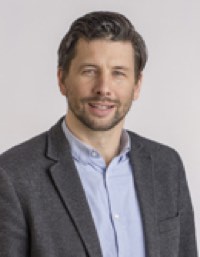
Proteome Research
Institute for Molecular Medicine
Heinrich-Heine-Universität Düsseldorf
Universitätsstraße 1
40225 Düsseldorf
Prof. Dr. rer. nat. Kai Stühler wurde 1971 in Solingen geboren. Nach einer Ausbildung zum Chemielaboranten studierte er Chemie an der Universität Wuppertal. An das Diplom schloss sich ein Promotionsstudium am Medizinischen Proteom-Center in Bochum an. Weitere Stationen seines Berufsweges waren die Universität Bochum, das BioMedizin Zentrum Dortmund und das Ludwig Institute for Cancer Research in Melbourne/Australien. 2007 habilitierte er sich im Fach „Molekulare Medizin“ an der Medizinischen Fakultät der Ruhr-Universität-Bochum.
Seit April 2011 ist er Professor für Proteomforschung an der Heinrich-Heine-Universität in Düsseldorf. Schwerpunkt seiner Arbeit ist u.a. die Sekreomanalyse mit dem Ziel der Charakterisierung der unkonventionellen Proteinsekretion. Innerhalb der DGPF unterstützt er seit 2006 den Arbeitskreis "Elektrophorese", „Proteomik-Technologien“ wie auch den Nachwuchskreis "SoGS".
Homepage: http://www.proteomforschung.hhu.de
Copyright des Fotos: Heinrich-Heine-Universität